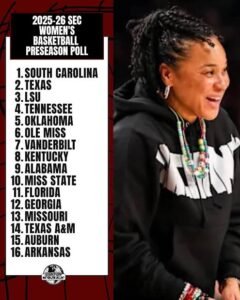SHOCKING: 5-Star Recruit Decommits from Tennessee, Flips to LSU Tigers Over Auburn and Florida State..
SHOCKING: 5-Star Recruit Decommits from Tennessee, Flips to LSU Tigers Over Auburn and Florida State
In a stunning turn of events that has sent shockwaves through the college football recruiting landscape, five-star wide receiver Tristen Keys has decommitted from the University of Tennessee and announced his commitment to Louisiana State University (LSU), choosing the Tigers over other top programs, including Auburn and Florida State .

A Sudden Shift in Commitment
Tristen Keys, a standout wide receiver from Hattiesburg High School in Mississippi, had been a cornerstone of Tennessee’s 2025 recruiting class . Known for his exceptional speed, precise route-running, and playmaking abilities, Keys was anticipated to make an immediate impact on the Volunteers’ offense . His decommitment marks a significant loss for Tennessee, which had invested considerable effort in securing his talents .
The decision to flip to LSU came as a surprise to many . Sources close to the recruitment suggest that LSU’s persistent efforts, coupled with the program’s recent successes and offensive scheme under head coach Brian Kelly, played pivotal roles in swaying Keys’ decision . Additionally, the opportunity to play in the Southeastern Conference (SEC) and compete at the highest level of college football was a significant factor .
LSU’s Recruiting Momentum
Keys’ commitment is a substantial boost for LSU’s 2025 recruiting class . The Tigers have been on a recruiting surge, securing top talents across various positions . The addition of Keys not only strengthens their receiving corps but also signals LSU’s continued prominence in attracting elite prospects .
This commitment follows LSU’s recent acquisition of five-star cornerback DJ Pickett, further solidifying their position among the top recruiting classes nationally . Pickett, ranked as the No. 9 player in the 2025 cycle by 247Sports, chose LSU over Oregon and Miami, highlighting the Tigers’ appeal to top-tier talent .

Implications for Tennessee and Other Programs
Tennessee’s loss of Keys is a significant setback . The Volunteers had envisioned him as a central figure in their offensive strategy . His departure necessitates a reevaluation of their recruiting approach to fill the void left by his decommitment .
Auburn and Florida State, both of which were in contention for Keys, also face the repercussions of his decision . Auburn, under head coach Hugh Freeze, has been actively pursuing top recruits to bolster their roster . Similarly, Florida State’s efforts to reclaim national prominence hinge on securing elite talent, making Keys’ choice a missed opportunity for both programs .
The Role of NIL in Modern Recruiting
The evolving landscape of college football recruiting, particularly with the advent of Name, Image, and Likeness (NIL) agreements, has introduced new dynamics into player commitments . While specific details regarding NIL deals in Keys’ recruitment remain undisclosed, the broader trend indicates that NIL opportunities are increasingly influencing decisions .
LSU head coach Brian Kelly has previously expressed concerns about the impact of NIL on recruiting . Following the loss of five-star quarterback Bryce Underwood to Michigan, reportedly due to a substantial NIL offer, Kelly criticized the current state of NIL culture, stating, “It’s not just about finding the right fit… it’s about the most money I can get,” highlighting the challenges programs face in this new era .
Looking Ahead
Tristen Keys’ commitment to LSU marks a significant milestone in the 2025 recruiting cycle . For the Tigers, it represents the acquisition of a game-changing talent poised to make an immediate impact . For Tennessee, Auburn, and Florida State, it underscores the competitive nature of recruiting in the modern era, where programs must navigate not only traditional factors but also the complexities introduced by NIL agreements .
As the college football landscape continues to evolve, the recruitment of players like Keys will remain a focal point, reflecting broader trends and the shifting dynamics of the sport .



